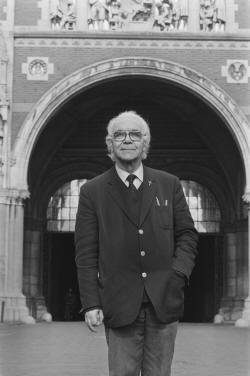 Johannes Cornelius Josephus (Jan) van Kilsdonk S.J., often called Pater Van Kilsdonk (Zeeland (Noord-Brabant), March 19, 1917 -Amsterdam, July 1, 2008) was a Dutch Jesuit theologian and pastor.
Johannes Cornelius Josephus (Jan) van Kilsdonk S.J., often called Pater Van Kilsdonk (Zeeland (Noord-Brabant), March 19, 1917 -Amsterdam, July 1, 2008) was a Dutch Jesuit theologian and pastor.
Queer Places:
Pater van Kilsdonkbrug, Vondelstraat, 1071 GV Amsterdam, Netherlands
Van Kilsdonkplein, 5411 TC Zeeland, Netherlands
 Johannes Cornelius Josephus (Jan) van Kilsdonk S.J., often called Pater Van Kilsdonk (Zeeland (Noord-Brabant), March 19, 1917 -Amsterdam, July 1, 2008) was a Dutch Jesuit theologian and pastor.
Johannes Cornelius Josephus (Jan) van Kilsdonk S.J., often called Pater Van Kilsdonk (Zeeland (Noord-Brabant), March 19, 1917 -Amsterdam, July 1, 2008) was a Dutch Jesuit theologian and pastor.
His family, a miller's family, and his ancestry enjoyed respect in the village of Zeeland (Noord-Brabant) near Uden, located on the edge of the Peel. At the age of seventeen, the very studious Van Kilsdonk enlisted in the Jesuits. On 7 September1934 he joined the Jesuits with 26 others. On August 22, 1945, after studying theology at the Canisianum in Maastricht, Van Kilsdonk was ordained a priest at the age of 28, which is on the young side in the Jesuit order. In his first years as a priest, he was a chaplain among interned ex-NSB members and political prisoners in Camp Vught and chaplain, where his respect for the marginal and suffering man was strengthened and he experienced how poor his Bible knowledge was. In fact, he had to go to Rome to continue studying theology and obtaining a PhD.
From 1947 to 1960 he was a religious teacher at the St. Ignatius College in Amsterdam. He passionately indulged in this task, trying to give the students the feeling that religion is "profundity, and beauty, ecstasy, and wonder." The literary critic Kees Fens was one of his pupils, as was his later brother Huub Oosterhuis. From 1948 to 1973, the father was a lecturer in ethics at the Academy of Physical Educationin the capital. In 1956 his life's work as a 'student moderator' began, an activity that he would continue to practice for decades according to his physical capabilities. Between 1959 and 1975 he led numerous retreats for priests of the Archdiocese of Utrecht. In 1960 a new phase in van Kilsdonk's life began, when he was appointed moderator of the Catholic Amsterdam student association Sanctus Thomas Aquinas, one of the most famous members of which was Pim Fortuyn. He remained attached to it until 1982.
In 1960 he founded the Amsterdam Student Ecclesia (VASE) in Amsterdam with the young student pastor Jos Vrijburg, who married in 1969, and with fellow student Huub Oosterhuis who married in 1970. When the student ecclesia came into conflict with the Haarlem bishop Theodorus Zwartkruis about the meaning of the Eucharist and the priesthood, Van Kilsdonk remained in solidarity with them, but remained a member of the Order and celibate. He focused on pastoral care and on 'meeting young people', men especially, with little or no commitment to a church, or no more, often with a complicated relationship with 'home', later especially homosexuals and in the 1980s, 1990s of the 20th century not infrequently young people who had been diagnosed with AIDS and for whom there was no salvation at the time. Since the very beginning, he visited those with HIV/AIDS in the departments of the Academic Medical Center in Amsterdam-Zuidoost.
Until old age he led funerals. To people who died of AIDS or who had died by suicide (in his words: "who could no longer love the light of day"), he gave a funeral like a king. For him there was nothing more moving than the singing of the closing song of the funeral liturgy, the In Paradisum: 'May the angels accompany you to paradise'.
Jan van Kilsdonk visited his 'clientele' until he was 65 years old, wandering past the student flats in Amsterdam and in the pubs in Mokum. The father became a phenomenon. Through his visit to pubs where he liked to drink a beer, he got the kindly intended nickname 'Kater van Pilsdronk'. Even after his 'retirement' in1982, his work continued.
In 1994 he was awarded the Bob Angelo medal of COC Nederland, the Dutch Association for the Integration of Homosexuality. In 1996 he was presented with the Gay Krant Award for his services to LGBT people. On February 14, 2006, he received the first Pink Sweetheart from Roze Links, the gay group of Groen Links, for his services to sexual diversity and gay emancipation.
In the last years of his life, Van Kilsdonk could be found every Sunday morning in the Dominicuskerk in Amsterdam, which in the last decades of the 20th century was a source of liturgical renewal within the Catholic Church and is today an ecumenical community inspired by the Christian tradition.
In October 2006, the municipality of Landerdin placed a bronze bust on the (already so called since 1964) Van Kilsdonkplein in his native village Zeeland (North Brabant). Among the speakers on that occasion were, apart from the almost 90-year-old himself, Huub Oosterhuis, Willem Aantjes and the writer Alex Verburg, by whom he had his memoirs recorded the following year (Pater van Kilsdonk. Counsel in delicate cases).
In 2017, Amsterdam named bridge 450 after him: Pater van Kilsdonkbrug.
My published books: